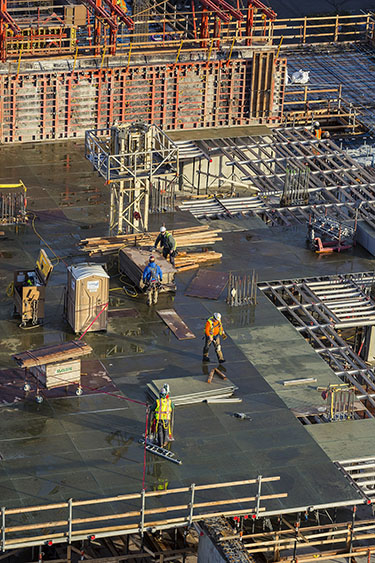|
Subscribe / Renew |
|
|
Contact Us |
|
| ► Subscribe to our Free Weekly Newsletter | |
| home | Welcome, sign in or click here to subscribe. | login |
Real Estate
| |
 |
February 25, 2016
10 questions developers should ask a contractor
GLY Construction

DeJarlais
|
Developers live in a crazy, competitive and often risky world of conceiving and delivering incredibly complex projects on fixed budgets and timelines. The process of navigating land purchases, financing, leasing, design, entitlements, permitting, construction, move-in and operations is not for the faint of heart, and unexpected setbacks lurk in every corner.
Despite these challenges, two things tend to remain static: the budget and the completion date. The task of hiring a team of specialists to help reach those goals can be daunting and uncomfortable. A construction partner is arguably the single greatest asset, or liability, if not chosen in a meaningful way.
The traditional request for proposal process focuses on quantitative criteria such as fees, team, business terms, and — depending on the information available — some form of cost estimate and schedule. Those are all good practices that fulfill basic internal controls for a selection process. But the quantitative data is no substitute for qualitative information that truly reveals whether or not the contractor is the right fit.
Developers need a construction partner that embraces project challenges as their own, a partner that proactively solves problems, and let’s face it, has the intelligence, character and a sense of synergy that everyone wants to be around for what can be years on many projects.
Beyond the traditional approach, here are 10 qualitative questions developers should ask a contractor before hiring them to ensure a great fit:
1. What is your company culture? The answer to this question is reflective of the company’s vision, values and purpose behind how its employees interact both internally and externally. It’s important to assess both character and conduct to find a good fit.
2. What do you know about me? This is a reverse of question No. 1. A good contractor understands they are ambassadors of your culture — and invests time embracing your challenges and believing in your business goals. They should be able to tell you how they’ll represent you appropriately and define their objectives to help make you successful.
3. How much prior experience does this team have together? There is no substitute for the synergy and track record of a team with a proven history of delivering great results. The introduction of different people invigorates a team and provides additional skills, but ideally the leadership has delivered several projects together.
4. Are you guaranteeing this team for the life of the project? Nobody wants to be a “bait-and-switch” victim. However, the number one staffing challenge a contractor faces is an uncertain project start. Open up an honest dialogue about what options exist in the event your project is delayed. In addition, have a candid conversation about how the contractor manages the transition from preconstruction to construction. A failed hand-off is one of the biggest (and most costly) disappointments for the entire project team.
5. Tell me about your safety program? In addition to learning industry-standard measures, such as an EMR or insurance rate, you want to know how much value a contractor places on maintaining a controlled and organized jobsite. If you can, tour a project under construction to see their safety philosophy up close. You should also ask for three subcontractor references. Approximately 80-90 percent of a project’s scope is subcontracted; ask references to describe their experience working with that contractor. A clean and orderly site minimizes both time and material waste, promotes quality and respects human lives.
6. What is your estimating method and how will you control the budget? As the project design evolves, so should the budget. A good contractor helps you prioritize critical decisions, but also ensures you have ample time to consider choices. Ask what tools and technologies the contractor uses to see what isn’t drawn yet. Early alignment of the design and budget is a foundation for project success, and avoids wasted time and expense backtracking on design.
7. How do you envision building this project?This question is for the superintendent, the single person with the most direct impact on the construction process. A superintendent manages project risk daily, and must have a crystal-clear plan for the schedule and the site logistics. Their ability to articulate the plan foreshadows how well they will communicate with their field personnel and subcontractors.
8. How will you help me solve this challenge? Put a real issue on the table. It can instantly reveal how the contractor deals with adversity. If you direct this question to a team, watch for a project manager who probes with questions to understand, and provides options to develop the best solution.
9. What will you do for me in the next 60 days? In this busy market, preconstruction and construction phases are moving closer and closer together, many times overlapping. A contractor should feel the urgency of this phase of planning and decision making. Ask for specifics around activities that support you and the extended design team. How will they be attentive to the schedule, and appropriately engage early subcontractor support? Material procurement, for example, is especially critical to keeping the project on track and on budget.
10. How will you help manage my specialty contractors? You have a business right to directly hire specialty contractors. A proactive contractor will embrace this, and will be able to tell you how they plan to integrate those companies from a risk management, coordination and scheduling standpoint.
Cost, schedule and quality — the old adage is that you can only pick two. These questions should help differentiate your options so you can determine which contractor lets you pick all three.
Bill DeJarlais is a principal and senior project manager at Bellevue-based GLY Construction, one of the region’s largest locally owned contractors, and leads the firm’s technology oversight committee.
Other Stories:
- Institutional owners move in on local market
- Office market shows no signs of slowing down
- Survey: Low Income Housing Institute
- Survey: Daniels Real Estate
- Survey: Touchstone
- Survey: Schnitzer West
- Survey: Urban Visions
- Survey: Lake Union Partners
- 3 projects are putting a new face on the Denny Triangle
- Fighting blight? Condemnation may be the way to go
- Greenbacks available for local brownfields
- 10 questions developers should ask an architect
- For apartments: Go West young man, go Northwest!
- Get ready for a soft landing in lodging
- Survey: American Life



